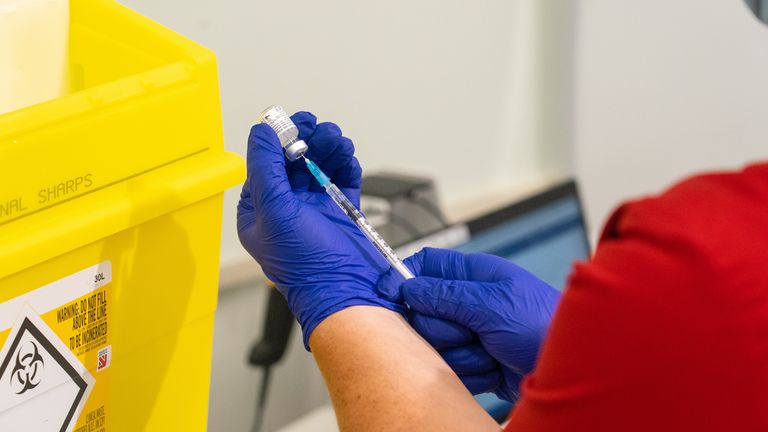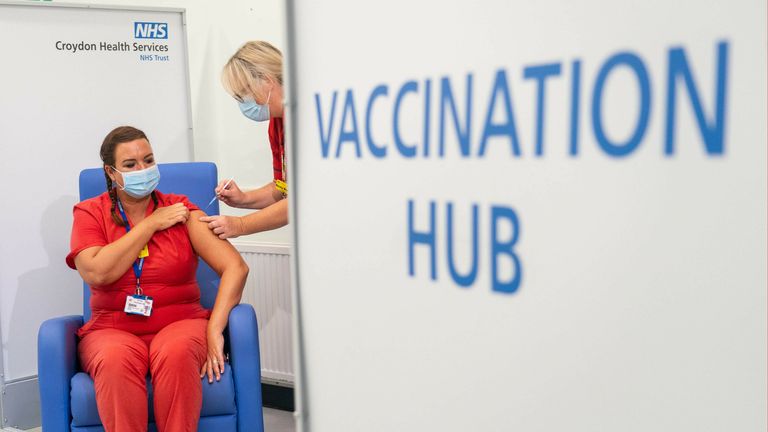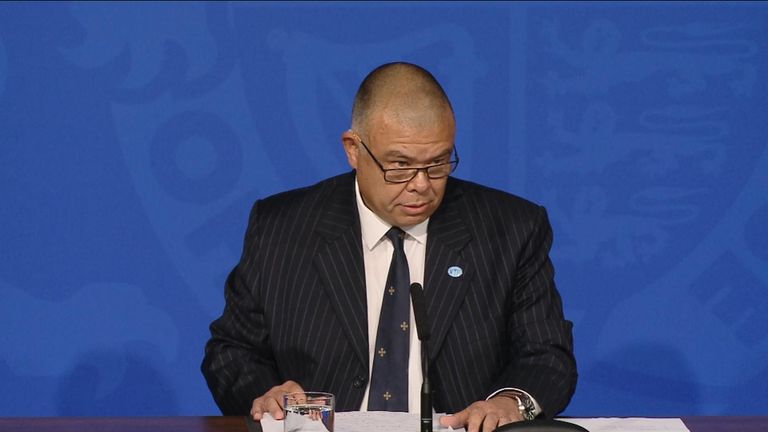COVID-19: Vaccine booster programme begins as NHS starts giving third jabs
The NHS has started rolling out COVID-19 booster jabs – as figures show that more than one in five adults under 40 have still not had any COVID jab at all.
Over 50s, people in care homes, frontline health and social care workers and vulnerable people between 16 and 49 are among those who will be offered a third dose.
At least six months must have passed since the second jab.
Hospital hubs began giving third doses to health and social care workers on Thursday, NHS England said, with other eligible people now being identified.
GP vaccination services will follow in the coming days and the full rollout will start next week as more vaccination centres and pharmacy centres finish final checks.
NHS England said people would be contacted by their GP or the National Booking Service when they become eligible.
One of the first to get a third jab was Catherine Cargill, a maternity support worker at Croydon University Hospital.
She said it would enable her to stay protected and “make sure I can carry on working, I can carry on spending time with my family, and so I can carry on with my studies”.
Ms Cargill added: “I would definitely want to encourage you to get your booster shot when you are invited to do that.”
Nikki Kanani, deputy lead for the vaccination programme, said the NHS would contact people when it is their turn.
“Now that the decision has been taken by the JCVI and once the relevant checks are in place, the NHS will invite you for your booster vaccination,” she said.
“There is no need to contact the NHS – we will be in touch with you when it is your turn to get your booster vaccine – at least six months on since your last dose.”
About 4.5 million people will be eligible in the coming weeks – and care home residents and staff are being prioritised to ensure they are offered the booster by the start of November.
NHS England said some in the original nine priority groups would not become eligible until the New Year.
It comes after the the Joint Committee on Vaccination and Immunisation (JCVI) backed the booster programme on Tuesday.
The expert panel said the first-choice booster should be the Pfizer vaccine, or alternatively a half-dose of a Moderna jab as it works just as well.
JCVI chair Professor Wei Shen Lim said that the booster advice was just for this winter and younger people might not need a booster, but that advice would be issued in due course.
In a statement, Health Secretary Sajid Javid said: “It is brilliant to see that the first booster jabs are being rolled out today – thanks to the phenomenal efforts of the NHS who continue to work tirelessly to help us fight COVID-19 and protect the most vulnerable.”
He urged anyone who’s eligible to come forward when invited ahead of the winter months, when infections and hospitalisations are likely to increase.
The government has also said that all healthy 12 to 15-year-olds will be offered a single dose of the Pfizer vaccine, with that programme to start next week.
Rich countries administering third jabs has attracted some controversy given that many developing nations still have low rates of people who are double-vaccinated.
The head of the World Health Organisation has said giving boosters to more than just vulnerable people was “really not right”.
Dr Tedros Adhanom Ghebreyesus said countries should think twice before doing so, noting there was still not enough evidence to show that booster jabs are required.
Meanwhile, figures published by the UK’s four health agencies show that a large minority of young adults remain reluctant to get the jab.
By nation, estimates for the percentage of unjabbed 18 to 39-year-olds are:
Scotland – 21%
Northern Ireland – 25%
Wales – 23%
England – 22%
In total, 4.2 million adults under 40 are yet to have their first vaccination, including 2.7 million aged between 18 and 29.
Source: Read Full Article





